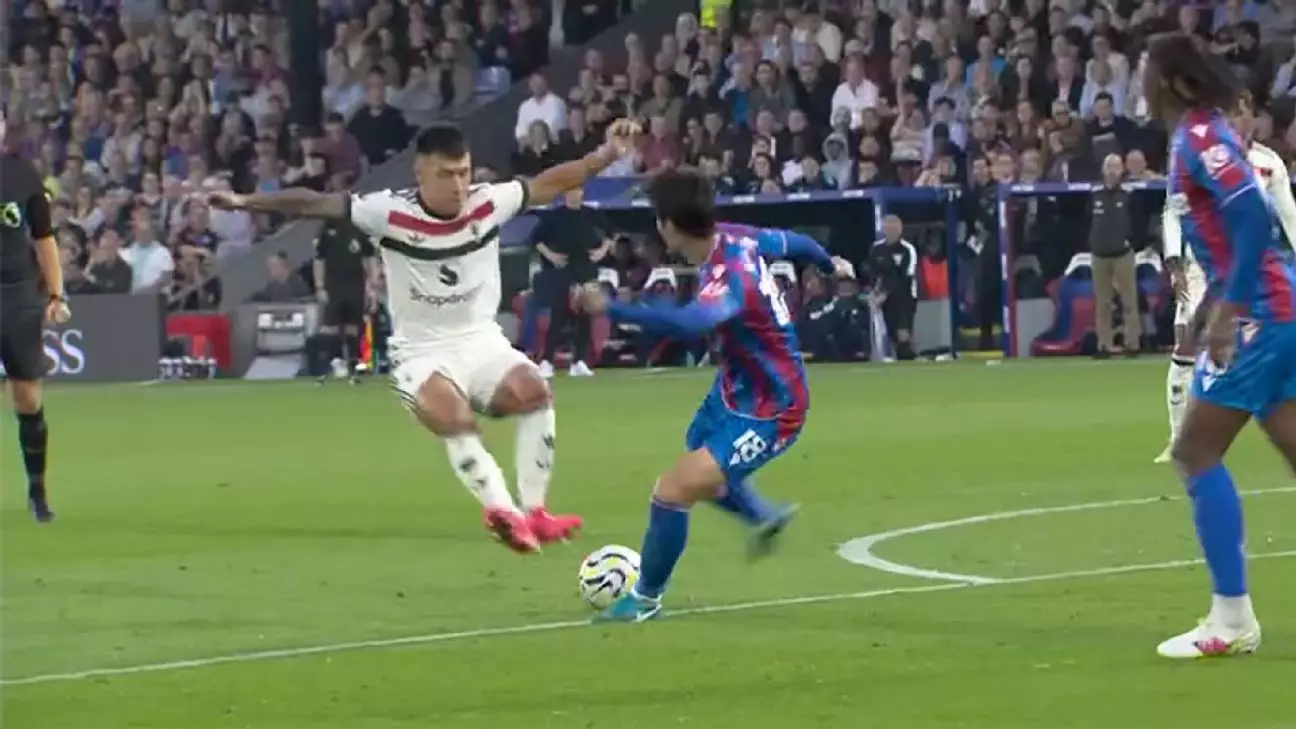The Premier League has always stood at the intersection of passion, skill, and often, controversy. In this season’s unfolding drama, the Independent Key Match Incidents (KMI) Panel has recently weighed in on significant decisions from matchday five. Their evaluations, which follow strict guidelines from UEFA and PGMOL, highlight the complex nature of officiating in football, especially with the introduction of Video Assistant Referee (VAR) technology. This article delves into the implications of these decisions and the broader context of fairness and clarity in the beautiful game.
In the tightly contested 0-0 draw between Manchester United and Crystal Palace, a pivotal incident centered on Lisandro Martínez’s tackle on Daichi Kamada. Referee David Coote issued a yellow card for the challenge, prompting VAR Chris Kavanagh to review the incident. Kavanagh ultimately decided against sending Coote to the pitchside monitor, adhering to UEFA guidance that suggests a yellow card suffices in instances with no contact.
However, the KMI Panel’s commentary on this incident reveals a striking dichotomy. While they supported the notion that no contact warranted a yellow card, they criticized Martínez’s action as reckless. The panel reasoned that the challenge appeared dangerous, stating, “the action viewed in isolation is a ridiculous challenge.” This acknowledgment of reckless intent, coupled with the absence of tangible consequences, raises questions about the effectiveness of existing guidelines. If a challenge is deemed outrageous but not punishable under current protocols, what message does that send to players about acceptable conduct on the pitch?
Undoubtedly, the inconsistencies in officiating extend beyond Martínez’s tackle. Consider the contrasting evaluations of Arsenal’s Leandro Trossard, who received a second yellow card for delaying a restart during the match against Manchester City, and Nottingham Forest’s Morgan Gibbs-White, whose sending off was contested. While the KMI Panel supported the Trossard decision with a 4-1 vote, they found Gibbs-White’s challenge insufficient for a second caution. Such disparities illuminate the subjective nature of officiating decisions and the inherent challenges in establishing a unified standard across matches.
The panel’s statement regarding Gibbs-White’s challenge highlights the difficulty in defining “recklessness,” emphasizing the need for clarity in what constitutes a cautionable offense. The division within the panel, deciding 3-2 against the second caution for Gibbs-White, exemplifies the vast gray areas that can make or break a match, influencing both team morale and league standing.
Another contentious point arose in the match between West Ham United and Chelsea concerning a potential penalty. Chelsea’s Wesley Fofana’s hold on Crysencio Summerville was deemed worthy of further scrutiny, with the KMI Panel recommending that the penalty should have been awarded. However, they simultaneously concluded that the incident did not rise to the level that necessitated VAR intervention. This again emphasizes the perplexing nature of VAR—an apparatus designed to ensure fairness, yet fraught with subjectivity and inconsistency.
The argument here revolves around whether the failure to award a penalty exhibits a flaw in officiating protocol, or whether it reflects the evolving understanding of VAR’s role. Critics could argue this points to a fundamental flaw in the system, where egregious fouls can go unpunished simply because they don’t meet the threshold of an “obvious error.”
As the season progresses, the question abounds: has VAR truly improved officiating? While this season boasts only one incorrect VAR decision thus far, compared to seven at the same juncture last year, the question of effectiveness remains nuanced. The KMI Panel’s reflections suggest an inconsistency in adjudicating potential errors on the pitch, which, if unaddressed, may undermine the purpose of implementing VAR in the first place.
Moreover, there seems to be a growing need for clearer guidelines on what constitutes a “clear and obvious error.” While VAR was introduced with the intent of correcting blatant mistakes, the ongoing debates within the KMI Panel suggest that the lines are still blurred, leaving teams and officials in a fog of uncertainty.
As the Premier League continues into its season, the implementation and impact of VAR and officiating protocols will remain a focal point of discussion. The decision-making processes of referees and panels like the KMI must evolve alongside the game itself, fostering an atmosphere of clarity and fairness. Unequivocal standards and clearer communication to players and audiences are integral to restoring faith in the officiating system. Ultimately, football thrives on the balance between competition and fairness, and ensuring this balance is paramount for the future of the sport.
